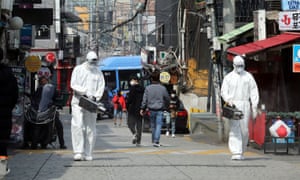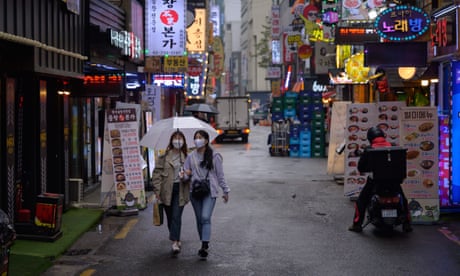Fears people will fail to get tested out of fear after new cases linked to Seoul gay district
Nemo Kim in Seoul THE GUARDIAN Mon 11 May 202

Quarantine workers spray disinfectant in Itaewon neighbourhood on Monday. Photograph: YONHAP/Reuters
Authorities in South Korea are struggling to contain a new coronavirus outbreak linked to the capital’s nightclub district as a backlash against the country’s gay community increases, prompting fears LGBT people will fail to get tested out of fear of being outed.
South Korea had been praised for its innovative efforts to contain the pandemic, going from the second most infected region outside China to having just a handful of cases before the latest outbreak a week ago.
But the increasing number of cases related to nightclubs in Seoul is raising concerns about a possible second wave as well as over the high level of deeply entrenched homophobic attitudes in the conservative society.
Of 35 new cases, 29 were found to be linked to Itaewon, the capital’s gay district, according to officials from the Korean Centers for Disease Control and Prevention (KCDC), bringing the total number of cases related to the clubs to 86.
The emergence of the cluster prompted officials to push back the re-opening of schools by one week, with students initially set to return to classes in stages starting Wednesday.
Vice-education minister Park Baeg-beom said the delay was “inevitable” in order to guarantee the safety of students.
After Kookmin Ilbo, a local media outlet with links to an evangelical church, reported that businesses visited by an infected man over the long weekend were gay clubs, many other South Korean media followed suit, revealing not only the identity of clientele but also some of their ages and the names of their workplaces.
The media frenzy reached a new level when another infected man was found to have been to an LGBT sauna in Gangnam, prompting a slew of homophobic content in newspapers and online.
Lurid reporting, along with South Korea’s use of the trace and test method, has led to members of the gay community reporting feeling scared to get tested and even suicidal. Officials said 3,112 people who were in the nightclubs were currently not contactable.
“I admit it was a huge mistake to visit the gay district when the corona situation was not fully over,” Lee Youngwu , a gay man in his30s, told the Guardian “But visiting the area is the only time when I can be myself and hang out with others similar to me. During the week, I have to pretend to like women.
“My credit card company told me that they passed on my payment information in the district to the authorities. I feel so trapped and hunted down. If I get tested, my company will most likely find out I’m gay. I’ll lose my job and face a public humiliation. I feel as if my whole life is about to collapse. I have never felt suicidal before and never thought I would, but I am feeling suicidal now.”

On Saturday the prime minister, Chung Sye-kyun, urged the public to “refrain from criticising a certain community as it will not help efforts to contain the coronavirus spread”.
Lee Jong-geol, the general director of Korean gay men’s human rights group Chingusai, told the Guardian that the group had begun counselling and legal aid services for those affected by the crisis, adding that Seoul city officials asked the group to encourage gay men who had visited the clubs to come forward to get tested.
“I understand that civil servants want to find a convenient way to do their jobs but they should realise that South Korea’s gay people do not all belong to one, single group. Civil servants are handling the situation in the same way as the Shincheonji cult situation, but we’re not a cult.”
Lee Jae-myung, governor of Gyeonggi province near Seoul, where many of the infected people live, said it would be possible for people to get tested free of charge by only saying they had been to the outbreak area and not having to mention the names of businesses they visited.
“It took me a whole week to get up the courage to get tested,” Min Jaeyoung, 27, told the Guardian, “I had to practise saying ‘oh, of course I’m not gay’ and even recorded myself several times to sound natural. I even put up photos of footballers and Korean hip-hop artists on my [social media accounts] to try to seem straight. I even got ready to look for another job. As it turned out, I was not infected but I cried when I got that text not because I was happy not to be infected but because I really hate being a gay man in this country.”
The mayor of Seoul, Park Won-soon, said on Monday that while he would guarantee anonymity when people got tested, there would be a fine of 2m Korean won (£1,320) for those who did not get tested . He also said anyone who did not come forward would be visited at home by officials accompanied by police.
Authorities in South Korea are struggling to contain a new coronavirus outbreak linked to the capital’s nightclub district as a backlash against the country’s gay community increases, prompting fears LGBT people will fail to get tested out of fear of being outed.
South Korea had been praised for its innovative efforts to contain the pandemic, going from the second most infected region outside China to having just a handful of cases before the latest outbreak a week ago.
But the increasing number of cases related to nightclubs in Seoul is raising concerns about a possible second wave as well as over the high level of deeply entrenched homophobic attitudes in the conservative society.
Of 35 new cases, 29 were found to be linked to Itaewon, the capital’s gay district, according to officials from the Korean Centers for Disease Control and Prevention (KCDC), bringing the total number of cases related to the clubs to 86.
The emergence of the cluster prompted officials to push back the re-opening of schools by one week, with students initially set to return to classes in stages starting Wednesday.
Vice-education minister Park Baeg-beom said the delay was “inevitable” in order to guarantee the safety of students.
After Kookmin Ilbo, a local media outlet with links to an evangelical church, reported that businesses visited by an infected man over the long weekend were gay clubs, many other South Korean media followed suit, revealing not only the identity of clientele but also some of their ages and the names of their workplaces.
The media frenzy reached a new level when another infected man was found to have been to an LGBT sauna in Gangnam, prompting a slew of homophobic content in newspapers and online.
Lurid reporting, along with South Korea’s use of the trace and test method, has led to members of the gay community reporting feeling scared to get tested and even suicidal. Officials said 3,112 people who were in the nightclubs were currently not contactable.
“I admit it was a huge mistake to visit the gay district when the corona situation was not fully over,” Lee Youngwu , a gay man in his30s, told the Guardian “But visiting the area is the only time when I can be myself and hang out with others similar to me. During the week, I have to pretend to like women.
“My credit card company told me that they passed on my payment information in the district to the authorities. I feel so trapped and hunted down. If I get tested, my company will most likely find out I’m gay. I’ll lose my job and face a public humiliation. I feel as if my whole life is about to collapse. I have never felt suicidal before and never thought I would, but I am feeling suicidal now.”

On Saturday the prime minister, Chung Sye-kyun, urged the public to “refrain from criticising a certain community as it will not help efforts to contain the coronavirus spread”.
Lee Jong-geol, the general director of Korean gay men’s human rights group Chingusai, told the Guardian that the group had begun counselling and legal aid services for those affected by the crisis, adding that Seoul city officials asked the group to encourage gay men who had visited the clubs to come forward to get tested.
“I understand that civil servants want to find a convenient way to do their jobs but they should realise that South Korea’s gay people do not all belong to one, single group. Civil servants are handling the situation in the same way as the Shincheonji cult situation, but we’re not a cult.”
Lee Jae-myung, governor of Gyeonggi province near Seoul, where many of the infected people live, said it would be possible for people to get tested free of charge by only saying they had been to the outbreak area and not having to mention the names of businesses they visited.
“It took me a whole week to get up the courage to get tested,” Min Jaeyoung, 27, told the Guardian, “I had to practise saying ‘oh, of course I’m not gay’ and even recorded myself several times to sound natural. I even put up photos of footballers and Korean hip-hop artists on my [social media accounts] to try to seem straight. I even got ready to look for another job. As it turned out, I was not infected but I cried when I got that text not because I was happy not to be infected but because I really hate being a gay man in this country.”
The mayor of Seoul, Park Won-soon, said on Monday that while he would guarantee anonymity when people got tested, there would be a fine of 2m Korean won (£1,320) for those who did not get tested . He also said anyone who did not come forward would be visited at home by officials accompanied by police.
No comments:
Post a Comment